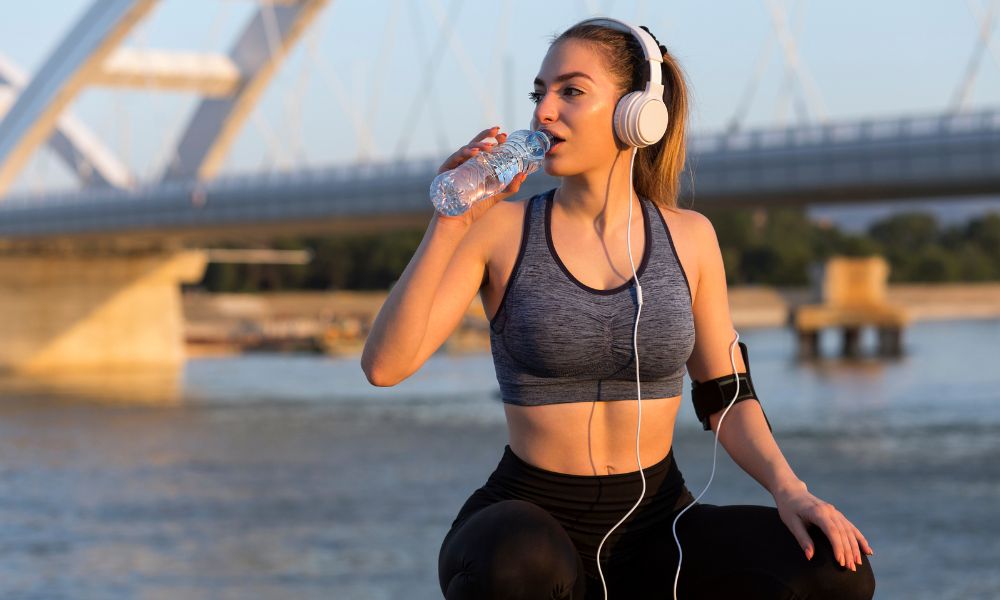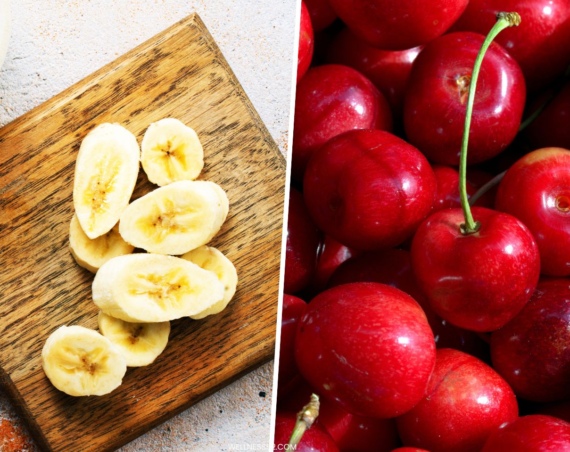
Water is essential for our survival. However, some of us may be going days without having a glass of plain water. It’s easy to forget about, especially when you are drinking other beverages throughout the day. Not to mention, water can be just plain boring to drink.
If you are someone who only drinks water when they are thirsty, or simply prefer other drinks, you may be dehydrated.
This can show up in the form of dizziness, fatigue, excessive snacking, and dry mouth. Some people may not experience any symptoms while for others it can be miserable.
To avoid this, it’s important to make sure you are prioritizing sipping on plain water throughout the day. Many people don’t even know if they are meeting their water goals or not because it isn’t clear how much water we should be drinking.
Many sources recommended consuming a gallon of water a day. But is that really the recommendation and what would happen if you did drink that much water daily? Let’s find out.
How Much Water Should You Be Drinking?

When trying to learn your water intake, chances are you will get led down the Google rabbit hole. Although the original rule of 8 8-ounce cups of water per day is a good place to start, this is nowhere near close to what some people may need.
Some sources suggest consuming 13 (8-ounce) cups of liquids per day with at least 9 of those cups being plain water (1). Other sources suggest consuming half of your body weight in water per day as an easy estimation. But, this also leaves some lacking (2).
According to the U.S. Academy of National Sciences, Engineering, and Medicine, Men should aim for 15.5 cups of water per day (3.7L), while women should aim for 11.5 cups per day (2.7L). This is close to a gallon for men and roughly ¾ of a gallon for women (3).
This is a good guideline but, everyone’s needs are a little different. The amount of water you need will vary based on your weight, gender, life stage, the climate you live in, your level of physical activity, and your diet.
If you want to jump on the TikTok trend of trying to get in at least a gallon of water per day, you may notice some interesting changes.
However, it’s important that you speak with your doctor before bumping up your water intake to make sure it’s safe. If you get the all-clear, below are some positives to upping your water consumption that suggest this target is a good one for you.
It Could Help You Maintain a Healthy Weight

If you are looking to lose weight, increasing your water may be a good place to start. Consuming more water could help you maintain a healthy weight and may even boost weight loss. This is because being adequately hydrated is associated with decreased snacking behaviors.
Sometimes our brain confuses hunger and thirst. this can cause us to reach for a snack instead of a glass of water when we are dehydrated.
Increasing our water intake can help reduce these cravings while also keeping us feeling full between meals. It may also help reduce portions when consumed right before a meal (4, 5).
Additionally, swapping out sugary drinks like sodas and juices, with water can help cut down on total calorie intake.
As if that isn’t enough reason to grab your favorite water bottle, drinking more water may even help to boost your daily calorie burn by 24-30%. This increased burn begins within 10 minutes of drinking water and will last at least an hour [6, 7, 8].
Many studies support increasing water for weight loss but, water intake itself will not lead to big changes in weight. This behavior needs to be combined with other lifestyle changes for the most benefit.
You Will Have to Use the Restroom More
The reason many don’t prefer to increase their water intake is that it’s not fun having to run to the bathroom every 5 minutes. Of course, increasing your water intake to a lofty goal of a gallon per day will lead to more regular visits to the loo.
When bumping up your water it’s important that you sip on it throughout the day and avoid chugging it just to get it down. Your body can only use so much water at a time so whatever it doesn’t need will need to be removed.
Chugging water does not hydrate you well and can lead to electrolyte disturbances. Although it’s tempting if you realized halfway through the day you haven’t had a single sip of water, try to avoid this.
Instead, keep a large water bottle filled near where you spend most of your time, such as your desk at work. This will help to provide a visual reminder for you to sip on it more throughout the day.
This will also avoid very frequent bathroom trips in a short period. However, with any increase in water comes an increase in urination so it’s best to be prepared for this. You can taper down your water intake a few hours before bed to avoid waking frequently in the night to use the restroom.
You May Be More Regular
Your digestive system requires water to function at its best. If you aren’t getting enough water in your diet, it can slow things down and lead to uncomfortable side effects such as constipation. Although fiber is an important component in digestion, bumping up your fiber intake can result in constipation if you aren’t hydrated.
Fiber pulls water from your lower intestines to get things moving. Without enough water, things won’t move efficiently, and the results are not ones you want to be getting familiar with. Getting enough water can help reduce constipation symptoms.
]It can also help your digestive system be more regular, something I think we can all hope for.
You May Have More Energy
Drinking loads of coffee, tea, and energy drinks only to find yourself still feeling sluggish? You’re probably dehydrated. Consuming large amounts of caffeinated beverages pulls water out of your body.
With each caffeinated beverage you consume, it’s recommended to add a glass of water to help counteract this effect. However, it’s difficult to drink that many liquids in a day for many.
Chronic dehydration from high caffeine intake can make you feel run down. You may experience low energy levels which can be frustrating considering the amounts of caffeine you are consuming. Instead, increase your water intake and limit caffeinated beverages to 1-2 cups per day. Chances are, you’ll notice a significant energy boost within the first day or two, you’re welcome [9].
It May Alter Your Hunger and Satiety Cues
Listening to your body and becoming familiar with your hunger and satiety cues is important. Although consuming adequate water is important for health and may decrease snacking, it may make it harder for you to listen to your body’s cues.
When consuming large amounts of water throughout the day, especially in one sitting, you may be stretching out your stomach. Water adds volume to your stomach, especially when combined with a meal.
This can leave you uncomfortably full. If you practice this during every meal it can cause you to require more food to feel satisfied and may increase the chances of gaining weight.
Although it’s tempting, resist the urge to use water as a tool for weight loss. Instead, combine it with other healthy lifestyle habits such as a healthy diet.
This can help to ensure you are getting the most benefits from increasing your water intake without sabotaging your weight loss.
You May Notice You Need Electrolytes
A gallon of water a day is a lofty water goal. Consuming this much water per day can require more electrolytes to avoid a deficiency as electrolytes absorb water.
If you are frequently hitting the bathroom, you may need to add an electrolyte powder or a pinch of salt to one of your glasses of water.
Your Skin May Improve
It’s not the fountain of youth, but it may make your skin appear more youthful. Consuming a good amount of water regularly can help keep your skin looking and feeling hydrated. Well-hydrated skin is visibly plumper and more youthful than dehydrated skin [10].
You May Be Less Prone to Urinary Problems
If you’ve ever experienced a urinary tract infection, you likely won’t ever want to experience them again. Well, water can help with that. Staying well hydrated helps to dilute your urine which can reduce the risk of infections. So, skip the cranberry juice and opt for a tall glass of water instead.
Additionally, adequate water intake can help to prevent the formation of kidney stones in those who are prone to them. Water can help prevent the stones from forming by reducing the ability of the crystals to stick together.
It May Improve Joint Pain
Water works for almost every aspect of our body, including our joints. We need to be adequately hydrated to have enough water to lubricate our joints properly.
If we don’t, we may experience joint stiffness and pain. If you want to move around more comfortably and easily, grab that glass of water, and get sippin’.


